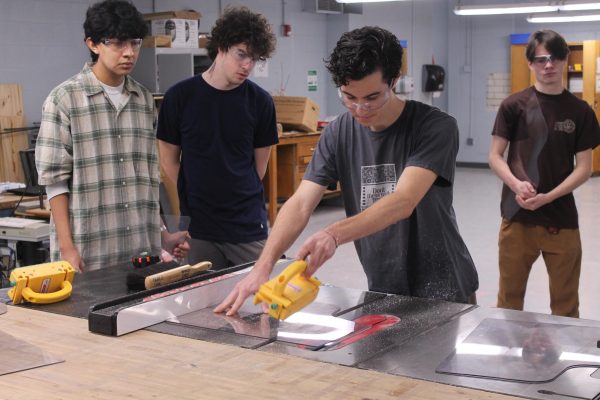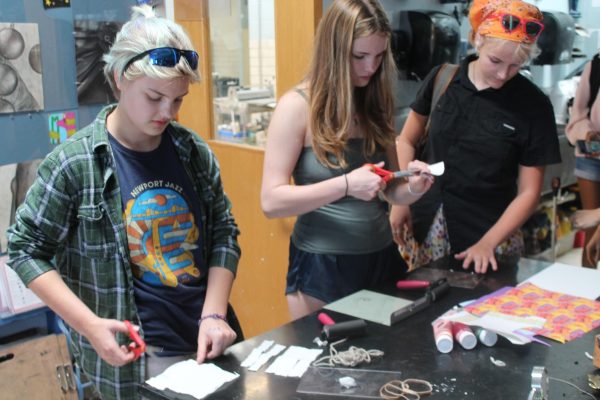Sticking for What’s Right
November 6, 2019
Whether it be in the media, from your teachers, or during a conversation with your friends, the word “global warming” is thrown around quite often. Understanding what it means and the cause surrounding it is something different.
During the Industrial Revolution, technological innovation began to spread all over the world, and suddenly our world was different. Humanity quickly became dependant on fossil fuels to help us power our societies. We began to burn non-renewable resources like coal, petroleum, and oil in order to keep factories running and money moving. In the process of burning these resources we also began to emit large amounts of greenhouse gasses such as carbon and nitrogen. While these gases are a naturally occurring component of our atmosphere, the recent actions of humanity have cultivated an abundance which threatens our environment. Through the exponential accumulation of these heat trapping gasses our planet has undergone an alarming increase in unnatural temperatures. Earth has been experiencing changes based on these temperatures for a while, but it was not until recently that people have begun to realize the danger we are in.
Climate strikes have become a way for people to advocate for themselves and their beliefs on the climate crisis. The number of climate strikes continues to grow, and the amount of people participating does as well. Something especially significant is the amount of young people participating. The Youth Climate Strike is an organization focused on getting youth in fighting for a climate debate in the 2020 election. Young activists in the media like Greta Thunberg show how critical the voices of today’s youth are in a time like this.
It was out of a sense of responsibility that students took to the streets around the world. On Friday, September 20, students protested against the lack of action from the government in regards to climate change. It was the largest striking event in the climate change movement yet. From all over the world, people left their schools to protest a future not promised to any of us. There were some LASA students that left, but the majority didn’t, myself included. Missing school is something the majority of LASA students–including myself–can’t afford to do. I wish I could, as the movement is something I care about, but I don’t even know if striking is effective. How can I make a difference without leaving school, and how does striking help the cause in the first place?
Organizing an event in objection to something like global warming does get the attention of people who can make a difference though. That’s why the organization of these events is important, because if it is big enough, the people who can make these changes in our environment will notice.
But what can you do if you can’t skip school? Studies show that 94 percent of teens use their phones daily, and that the majority use multiple social media applications. That’s how these protests and information about them is spread. Information about these strikes are usually shared pretty quickly so people will go on their social media and see all this information about what they can do. Even if you do not actively participate in the strike, advocating your opinion and concern on social media can be just as useful in making people aware and even getting others to participate even if you can’t.
I think striking is important and can be very useful in making change, but I don’t think it’s necessary. If for whatever reason you can’t strike or even if you don’t want to, that doesn’t mean you have to. There’s still things you can do to make a change and show support.
I also know there are people who don’t find climate change tangible or provable. I understand where they might be coming from, but I think being educated on such an important subject is vital, especially as a person who could wind up being part of the generation who will be responsible for the change in how we emit greenhouse gasses.
At this point in the crisis I also think that the only reason someone wouldn’t believe in climate change is due to lack of understanding or political stance. Climate change has been turned into something political, making the issue something that associates a person with a certain party based on their beliefs. In reality it’s a global emergency that should have never been labeled as a political issue.
The climate issue isn’t something that can be resolved on its own. Being an active supporter of the cause can be hard as a student though, so it’s understandable why some people might not want to do something like strike. I’m not against striking, but I think that in order for us to make future changes we have to start with a good education, which is why wanting to stay at school versus leaving to strike isn’t something to be frowned upon. Support comes in many ways and isn’t limited to striking. Instead, going onto a social platform and advocating, talking to your friends about the cause, or becoming more educated on the subject can be just as effective.






